|
|
|
Sort Order |
|
|
|
Items / Page
|
|
|
|
|
|
|
| Srl | Item |
| 1 |
ID:
141609
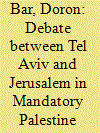

|
|
|
|
|
| Summary/Abstract |
During the Mandate era a custom of re-interment of Jewish thinkers and leaders developed. These were mostly Zionists leaders and ideologists who passed away in the Diaspora and their remains were brought to be buried in Palestine. The article deals with the conflict between Tel Aviv and Jerusalem on the right to re-inter within their boundaries Zionist leaders such as Theodor Herzl, Max Nordau, Leo Motzkin and Yehuda Leib Pinsker. Although this phenomenon was universal, the Zionist case was unique and exceptional as most of the political Zionist activity took place outside of Palestine, mostly in Europe.
|
|
|
|
|
|
|
|
|
|
|
|
|
|
|
|
| 2 |
ID:
141616


|
|
|
|
|
| Summary/Abstract |
This article deals with the education, the formation and the image of the student during the first years of the ‘Hebrew educational system’ in Eretz Yisrael. The Hebrew school was influenced by a strong wish to educate an individual to be productive and close to nature, in contrast to the image of the studious Jew, both traditional and modern. By way of examining whether and to what extent this approach resulted in a provincial nationalistic type of teaching that ignored the Humanities and general knowledge, this article will focus on five key elements of the education system in Eretz Yisrael: the educational viewpoint of the Zionist leadership and the examples set by the ‘Founders’ Generation’ for the ‘Second Generation’; curricula of the various Hebrew schools in Eretz Yisrael; textbooks and reference books accessible to young people; the image of the ‘Hebrew teachers’ who taught the Second Generation and their educational objectives; and children's newspapers and literature in Hebrew to which the Second Generation pupils had access.
|
|
|
|
|
|
|
|
|
|
|
|
|
|
|
|
| 3 |
ID:
141610


|
|
|
|
|
| Summary/Abstract |
This article analyses the evolution of the advanced industries in Israel and Ireland in the 2000s and the ways they were affected by, and responded to the two major crises of the decade: the dot.com crisis of 2001–2003, and the subprime crisis that began in 2008. Changes in the economic indicators of these countries during the crises are analysed and compared in detail, with a focus on the hi-tech industries. In addition, government responses to the crises to which the industries were exposed and the courses of action taken (if any) to cope with damage to the local economies in general and the hi-tech industries in particular are discussed.
|
|
|
|
|
|
|
|
|
|
|
|
|
|
|
|
| 4 |
ID:
141614


|
|
|
|
|
| Summary/Abstract |
There are two main opposing narratives employed by Israel's elite in its interaction with the Diaspora: one depicts the Jewish state as ‘strong, protective and salvaging’ and the other portrays it as a weak nation that ‘dwells alone’. This article argues that it is not only the two opposing narratives but also the same imagination agent that is an essential element of both Israel's political goals for the Diaspora and the Diaspora's transnational characteristics. It will also present a model for analysing the relationship between historical trauma and threat from future traumas as imagination agents, the Homeland political goals and trauma as the main diasporic characteristic.
|
|
|
|
|
|
|
|
|
|
|
|
|
|
|
|
| 5 |
ID:
141617
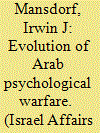

|
|
|
|
|
| Summary/Abstract |
Psychological warfare is a ‘soft power’ technique used to attain strategic objectives. In the Israeli–Palestinian dynamic, psychological warfare has evolved to where it now shares goals with ‘public diplomacy’ as a means of influencing policy and politics. Arab strategy has moved from ineffective attempts to influence the Israeli public to credible and cynical strategies that often involve a disregard for and exploitation of civilian casualties and the appearance of embracing ideology associated with revolutionary figures and human rights. ‘Non-violent resistance’ invoking Gandhi, Mandela and King as models for Palestinian Arab strategy is now common and serves to attract sympathy. Despite claiming a philosophy of nonviolence, the goal of many anti-Israel groups remains the dissolution of Israel as the state of the Jewish people.
|
|
|
|
|
|
|
|
|
|
|
|
|
|
|
|
| 6 |
ID:
141615


|
|
|
|
|
| Summary/Abstract |
Today India and Israel collaborate in defence, trade, strategic, and intelligence and security-related areas and the relationship is likely to become broader and more comprehensive over the long term, encompassing research, development and co-production in the defence sector, water resource management, science and technology, bilateral trade, and the non-defence sector. Based on a broad convergence of security, geopolitical and economic interests, this evolving partnership represents Delhi's shift from hostility towards the Jewish state to a more pragmatic and realistic approach.
|
|
|
|
|
|
|
|
|
|
|
|
|
|
|
|
| 7 |
ID:
141611
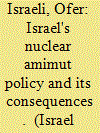

|
|
|
|
|
| Summary/Abstract |
In neither admitting nor denying its nuclear capabilities, Israel has adopted a policy of amimut, or ‘ambiguity’ in regard to its nuclear policy. By not acknowledging its nuclear capabilities, Israel has actually strayed from the traditional tenets of rational deterrence theory, which states that deterrence can be achieved when a state credibly communicates its capabilities and intent. Incredibly, despite the fact that Israel has not followed these tenets, it has still managed to achieve effective deterrence against non-conventional attacks, and furthermore avoid the automatic dire rebound results that typically accompany the build-up of arms in the international community. As successful as this approach has been, amimut has also resulted in the negative side effect of undermining Israeli democracy and perceived political control over national security affairs. This article explores the positive and negative impacts of this unique policy, and the consequences of maintaining or abandoning the policy of amimut.
|
|
|
|
|
|
|
|
|
|
|
|
|
|
|
|
| 8 |
ID:
141608


|
|
|
|
|
| Summary/Abstract |
This article investigates the relationship between Theodor Herzl’s journalistic career and his Zionist enterprise. Contrary to the received wisdom that Herzl’s post in the Neue Freie Presse had little to do with his Zionist vision, it is argued that his Zionist awakening sprang essentially from his experience as an influential journalist working in the early days of mass-circulation newspapers. It is further shown that once Herzl took up the Zionist cause he made a sophisticated use of mass-circulation newspapers and of his post in the Neue Freie Presse to bring about and propagate his Zionist plan. In the final analysis, it is suggested that Herzl’s position as a leading journalist working in the early days of mass-circulation played a key role in shaping his particular strand of political Zionism as well as in securing his initial leadership of the Zionist movement.
|
|
|
|
|
|
|
|
|
|
|
|
|
|
|
|
| 9 |
ID:
141618
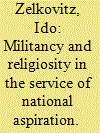

|
|
|
|
|
| Summary/Abstract |
As with other Arab identities, Palestinian identity is a product of myriad converging ideologies. In retrospect, its development was accompanied by dominant Middle Eastern ideologies, such as Arab nationalism, pan-Islamism and the rise of political Islam. Against this backdrop, the article discusses Islam's historical affinity and social role in the formative period of the Fatah revolutionary national movement. Both ideologically and socially, Islam was central to Fatah's ethic and served as an important tool for recruiting the masses to the Palestinian revolution.
|
|
|
|
|
|
|
|
|
|
|
|
|
|
|
|
| 10 |
ID:
141613
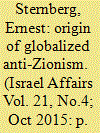

|
|
|
|
|
| Summary/Abstract |
The primary cause of global anti-Zionism can be found in the convergence of the post-Cold War crisis of Islam, the crisis of the post-communist Left, and Europe's civilizational crisis. Seeking new global visions for radical change, groups with discrepant agendas found solidarity through shared hatred of a fiendish entity, the one on which the alleged depredations of globalized, militarized capitalism could be blamed. Petrodollar and charity funding to defame Israel, media bias meant to do the same, and academic anti-Zionism are secondary phenomena, emanating from this global convergence.
|
|
|
|
|
|
|
|
|
|
|
|
|
|
|
|
| 11 |
ID:
141612
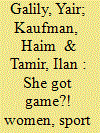

|
|
|
|
|
| Summary/Abstract |
The struggle of women worldwide for their right to self-realization in general and their proper representation in sports in particular included the struggle of the women in the Yishuv community prior to the establishment of the State of Israel, or in the Israeli society that was formed after the country was founded. The rapid increase in women's participation in sports in Israel over the last decades illustrates the change in the status of women in sports itself and in many other social areas, but in parallel, also exposes rigid thought patterns in regard to women's and men's involvement in sports. The different physical characteristics of men and women, and society's differing expectations influence involvement in sports and the success that women achieve in sport activities. This paper will trace, conceptually and historically, the different aspects of women's sports in Israel in the past and present, while presenting the central trends of the progression and limitations of the status of female athletes in Israel.
|
|
|
|
|
|
|
|
|
|
|
|
|
|
|
|
|
|
|
|
|